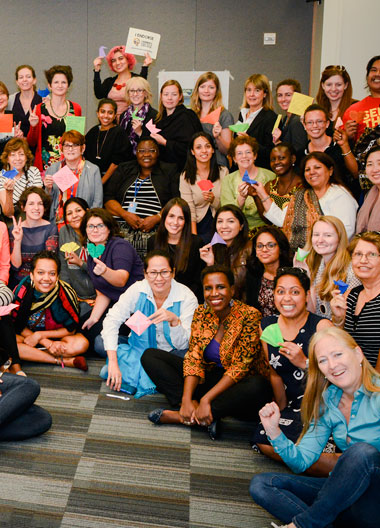The Women’s Major Group role and organisation
The Women’s Major Group (WMG) was created at the 1992 Earth Summit in Rio de Janeiro, Brazil, where governments recognized Women as one of the nine important groups in society for achieving sustainable development. The WMG is an official participant in the United Nations processes on Sustainable Development. Other processes use the major group or similar systems, with the WMG active in the processes of the United Nations Environment Program since 1996.
The Women’s Major Group has the responsibility to facilitate women’s civil society active participation, information sharing and input into the policy space provided by the United Nations (e.g., participation, speaking, submission of proposals, access to documents, development of sessions).
The WMG is self-organised and open to all interested organisations working to promote human rights-based sustainable development with a focus on women’s human rights, the empowerment of women and gender equality.
Who is part of the Women’s Major Group?
There are over 1300 listserv members who are organisations and individuals that contribute to intergovernmental negotiations on gender and sustainable development.
The policy processes of the Women’s Major Group
The Women’s Major Group (WMG) for Sustainable Development (SD) is the focal point for UN-DESA, ECOSOC and the General Assembly for all UN Sustainable Development policies. The mandate of the WMG for Sustainable Development covers Agenda 2030 for Sustainable Development (formerly post-2015), including the Sustainable Development Goals and Indicators, the Technology Facilitation Mechanism and the High-Level Political Forum (a key space for follow-up and review). It covers the Rio+20 outcome (SDGs, Financing for Sustainable Development, Small Island Development States SIDS, Technology). It also covers the regional sustainable development policy processes of the United Nations.
The WMG aims to cooperate closely with other Women’s Major Groups and Women’s constituencies linked to related UN policy processes on Environment, Climate, Biodiversity, Disaster Risk Reduction, Cities, Financing for Development, Habitat, Forests, Commission on Population and Development (CPD), Commission on the Status of Women (CSW) and sustainable development processes of the UN Regional Economic Commissions.

Participation of Women from Civil Society in UN Sustainable Development processes
The Women’s Major Group is an open-ended group that exists to facilitate the participation of women in UN processes on Sustainable Development and Environment. In that function, it has the opportunity for members to speak in the plenaries with the representatives of governments and in high-level meetings with Ministers and Heads of State. The WMG also may submit position papers as part of these processes.
The UN website for the Women’s Major Group is: Sustainable Development Knowledge Platform
The Women’s Major Group for Sustainable Development is self-organised and coordinates via a team of Organizing Partners, as well as through email listservs, working groups, strategic and capacity building meetings and social media. The overarching WMG interacts through a moderated listserv, primarily for information sharing. The WMG Advocacy Team is for more intense discussions and is open to civil society members only. Most of the working groups have a fluid structure and are thematic and time-bound groups, formed based on need and as capacity allows. Current working groups include the High Level Political Forum, Shadow Reporting and Indicators.
The WMG is one of several ‘Major Groups and Stakeholders’ with which it interacts on a regular basis for sustainable development processes, see here.

Governance of the Women’s Major Group
The United Nations (UN) asks the Major Groups to choose their own representatives at regular intervals. These representatives are called ‘Organising Partners (OPs)’ and ensure the communication with the UN Secretariat. In selecting OPs, the WMG aims regional balance, and for bringing together organizations that have expertise in relevant international and regional policy processes, thematic issues as well as organizational skills. The task of OP’s has grown from approximately 2 one-week events per year to almost weekly obligations. The UN does not provide core funding for this coordination effort by the OPs, or for travel. Many policy meetings take place in New York, along with regional meetings at the Economic Commissions at least one time per year. Thus the OP role involves fundraising, in addition to its facilitation, information sharing, advocacy, and capacity building tasks. OP’s are mandated for a 2-year period and to ensure continuity, OP’s can be elected at least twice.
The WMG Governance Document can be found here and the specific Terms of Reference of OP’s of the WMG on SD can be found here. While the WMG Principles & Values Document can be found here.
History of the Women’s Movement and Sustainable Development
The women’s movements played a key role in the road to the United Nations Conference on Environment and Development, and during the 1992 Earth Summit itself, when women from all over the world gathered in the Women’s Tent: or the ‘Planeta Femea’. Download the full information here.
